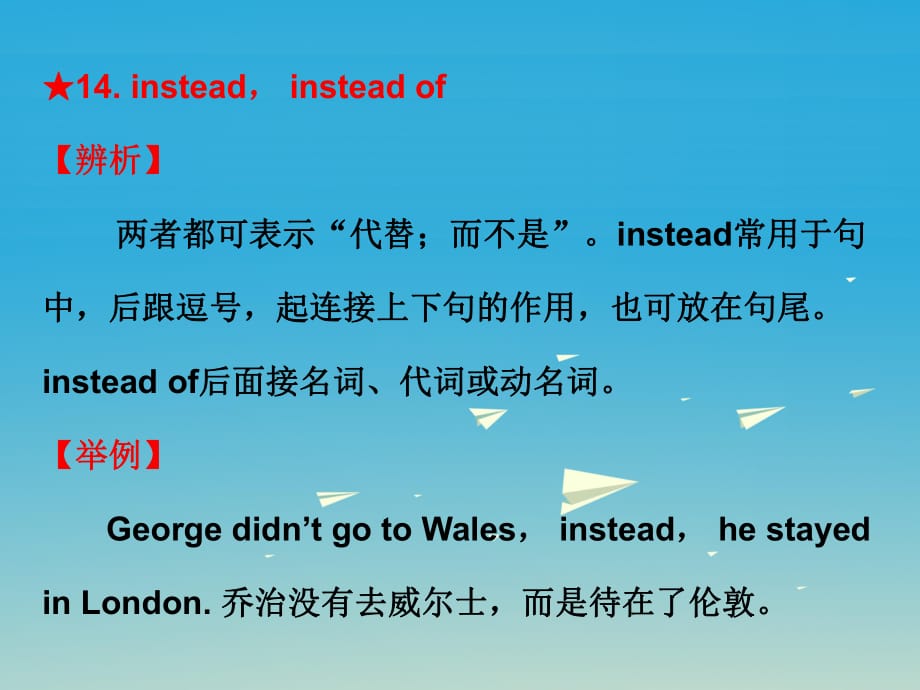《中考英語(yǔ)總復(fù)習(xí) 第一部分 常用單詞 詞組用法辨析 第一節(jié)6課件》由會(huì)員分享�����,可在線閱讀����,更多相關(guān)《中考英語(yǔ)總復(fù)習(xí) 第一部分 常用單詞 詞組用法辨析 第一節(jié)6課件(12頁(yè)珍藏版)》請(qǐng)?jiān)谘b配圖網(wǎng)上搜索�����。
1、14. instead���, instead of 【辨析】 兩者都可表示“代替��;而不是”��。instead常用于句中��,后跟逗號(hào)�����,起連接上下句的作用����,也可放在句尾��。instead of后面接名詞��、代詞或動(dòng)名詞���。 【舉例】 George didnt go to Wales�����, instead��, he stayed in London. 喬治沒(méi)有去威爾士���,而是待在了倫敦���。 Emma played tennis with Ann instead of going swimming with Kate.=Emma didnt go swimming with Kate, instead���, she played
2�、 tennis with Ann. 艾瑪沒(méi)有跟凱特去游泳��,而是跟安去打網(wǎng)球了���?���!狙菥殹? )1. Philip didnt go hiking with his sister, _�����, he stayed and played games alone at home. A. instead B. rather than C. instead of D. althoughA ( )2. Philip stayed and played games alone at home instead of _ hiking with his sister. A. went B. going C. to go
3�、 D. goes( )3. Will you go to the meeting instead of _?A. she B. hers C. her D. my( )4. He didnt give Jack the money, but he gave it to me _.A. instead B. that C. last D. instead of BCA 15. on time���, in time 【辨析】 (1)on time意為“準(zhǔn)時(shí);按時(shí)”����,指正好在約定的時(shí)間發(fā)生,言外之意是“既不早����,也不晚”。 (2)in time則表示“及時(shí)���;遲早”���,指在約定的時(shí)間之前發(fā)生,意指正趕上時(shí)候或
4��、恰在需要的時(shí)候�����。 【舉例】 Subways in this city are always on time. 這個(gè)城市的地鐵總是準(zhǔn)時(shí)的。 The ambulance got there just in time. 救護(hù)車(chē)正好及時(shí)趕到那里����。【演練】( )1. We want to start the meeting _ time�����, so please dont be late. A. on B. at C. with D. inA ( )2. As long as you stick to it, you will make progress _. A. in time B. at a time
5��、 C. at one time D. on time( )3. Thank you for telling me this news _. A. in time B. at times C. at one time D. on timeAA 16. under���, below 【辨析】 under指“在正下方�;少于(用于數(shù)量等)”�����,其反義詞為over���。below泛指“在下方���;少于(用于溫度����、高度等)”�����,其反義詞為above�。 【舉例】 I want to have a rest under the tree. 我想在樹(shù)下休息一會(huì)兒。 There is a lake below the mount
6��、ain. 山下有個(gè)湖�。 【演練】( )1. Theres a cat _ the table. A. in B. under C. next D. between( )2. Anyone who is _ 18 years old isnt allowed here. A. under B. less C. below D. onBA ( )3. The temperature today is ten degrees _ zero. Its freezing cold. A. above B. on C. below D. underC 17. until��, notuntil 【辨析】 兩者
7���、都可表示“直到”�。until意為“直到”�����,表示某一種行為一直持續(xù)到某一時(shí)間�,用于肯定句中,句子的謂語(yǔ)動(dòng)詞必須是延續(xù)性的。notuntil 意為“直到才”�,表示某一行為直到某一時(shí)間才發(fā)生,之前該行為并沒(méi)有發(fā)生����,用于否定句中,主句中的謂語(yǔ)可以是延續(xù)性動(dòng)詞��,也可以是短暫性動(dòng)詞����。 注意:until也可以作連詞,作連詞時(shí)���,后面要跟一個(gè)完整的句子���;而作介詞時(shí),后面要接名詞或名詞短語(yǔ)�。【舉例】 I studied English until 9 oclock last night. 我昨晚學(xué)英語(yǔ)一直學(xué)到9點(diǎn)鐘�����。(表示9點(diǎn)前一直在學(xué)���。) Jane didnt go to sleep until midnight yesterday. 昨天簡(jiǎn)直到午夜才睡覺(jué)�。(表示午夜前沒(méi)有睡。) 【演練】( )1. I _ the hospital until five oclock. A. left B. not leave C. didnt leave D. did leave( )2. She _ until ten oclock. A. went B. started C. waited D. died( )3. He didnt turn up _ half an hour later. A. for B. since C. in D. untilCCD
 中考英語(yǔ)總復(fù)習(xí) 第一部分 常用單詞 詞組用法辨析 第一節(jié)6課件
中考英語(yǔ)總復(fù)習(xí) 第一部分 常用單詞 詞組用法辨析 第一節(jié)6課件

